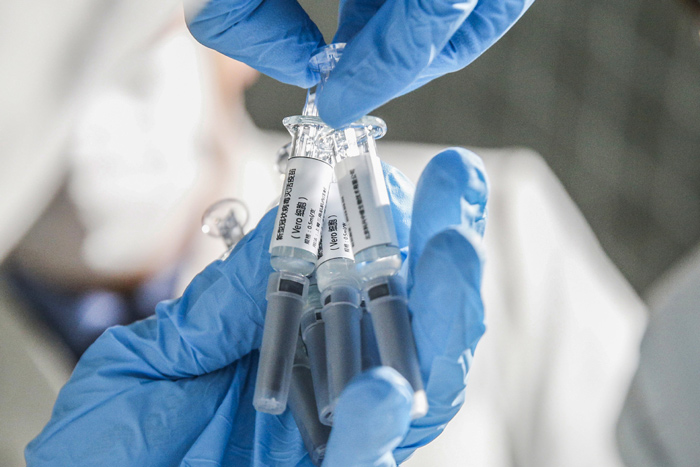如果新冠疫苗研制出来,你愿意接种吗?根据调查,中国人接种疫苗的积极性是最高的,而俄罗斯人的接种意愿是最低的。全球共有四分之一的人不愿意接种疫苗,世界经济论坛的专家表示,这足以抵消其他人接种疫苗的效果。

2020年3月16日,科兴中维工作人员展示新型冠状病毒灭活疫苗样品。(图片来源:新华社)
Around 74% of adults globally are willing to get immunized against the coronavirus if a vaccine became available — but that may not be enough to defeat the fast-spreading virus, according to a survey released Tuesday.
9月1日发布的一项调查称,如果能获得新冠疫苗,全球约有74%的成年人愿意接种,但这或许还不足以打败飞速传播的病毒。
The survey by World Economic Forum and market research firm Ipsos polled close to 20,000 adults across 27 countries over two weeks — between July 24 and Aug 7 this year.
世界经济论坛和市场调研公司益普索集团今年7月24日至8月7日期间开展的这项调查在两周时间内访问了27个国家的近2万名成年人。
A majority of respondents from all the countries expressed their willingness to get a vaccine, the survey results showed. China was the most enthusiastic country with 97% of respondents indicating they would want to be vaccinated, while Russia was the least willing with only 54% interested to do so, the survey found.
调查结果显示,来自所有这些国家的大多数受访者表示愿意接种疫苗。中国是最积极的国家,有97%的受访者表示想要接种疫苗,而俄罗斯的接种意愿是最低的,只有54%的人愿意接种。
Still, it’s concerning that roughly one-quarter of people globally not intending to get a vaccine, said an expert from the World Economic Forum.
世界经济论坛的一位专家指出,全球仍有约四分之一的人不打算接种疫苗,这让人感到担忧。
"The 26% shortfall in vaccine confidence is significant enough to compromise the effectiveness of rolling out a Covid-19 vaccine,” said Arnaud Bernaert, head of shaping the future of health and healthcare at the WEF.
世界经济论坛“塑造健康与医疗的未来”平台负责人阿诺德·拜尔内特称:“有26%的人对疫苗缺乏信心足以抵消推出新冠疫苗的效果。”
Covid-19 is the formal name of the coronavirus disease, which has infected more than 25.4 million globally and killed over 850,500, according to data compiled by Johns Hopkins University.
根据约翰斯•霍普金斯大学编纂的数据,全球新冠肺炎确诊病例逾2540万例,死亡病例逾85万零500例。
The most frequently cited reason for not wanting a vaccine is concern about the side effects, according to the survey findings. Other factors mentioned by respondents include their perception that a vaccine may not be effective and they’re not sufficiently at risk from the virus, the survey showed.
调查结果显示,不想接种疫苗最常用的理由是担心有副作用。受访者提到的其他因素包括他们觉得疫苗可能没有效果以及他们感染病毒的风险不太大。
以下是本次调查结果的其他亮点:
In the US, the country with the highest number of cumulative cases and deaths, 67% of respondents said they would get a vaccine;
在聚集性病例和死亡人数最多的美国,67%的受访者表示愿意接种疫苗。
Less than half — or around 41% — of respondents globally expect a vaccine to be available to the public this year;
全球不到一半(约41%)的受访者期待疫苗在今年向公众提供。
China was the most optimistic about the availability of a vaccine in 2020, while respondents from Poland and Japan showed the most skepticism;
对于2020年公众能否获得疫苗,中国人是最乐观的,而波兰和日本的受访者则是最悲观的。
only 34% of Americans expect a coronavirus vaccine to be ready this year.
只有34%的美国人期待今年能推出新冠疫苗。
Measures to contain the virus, such as border closures and restrictions on movements, have caused a slump in global economic activity. many governments and people now pin their hopes on a vaccine to help restore some normalcy in the world, but the World Health Organization has warned that a vaccine alone may not end the pandemic.
边境关闭和限制活动等防控病毒措施已经导致全球经济活动严重下滑。许多政府和民众现在都寄希望于疫苗来帮助恢复世界正常秩序,但是世界卫生组织警告称,光有疫苗可能还无法终结疫情。
There are at least 30 potential vaccines currently in clinical trials, according to the WHO.
世界卫生组织称,现在至少有30种候选疫苗在临床试验阶段。
英文来源:CNBC







